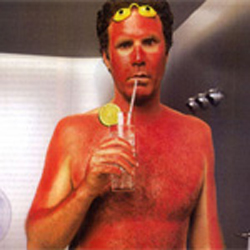
Allergic to the Sun?
Nothing is more heartbreaking for a nudist than to be told he/she is allergic to the sun! The condition is more common than you might think, with an estimated 10 to 20% of the world's population suffering from a range of symptoms from light skin irritation to severe rash. While people with light skin are most susceptible to sunburn, sun allergy affects people of all skin colors. Caucasians, Asians, Latinos and even Africans can develop photosensitivity suddenly, and at any time during one's life, although the condition usually manifests in people in their 20s and early 30s.
The sunscreen that advertisers claim can help protect you from most of the harmful effects of ultraviolet light will do little for certain sun-sensitive individuals. These would-be sun seekers wind up with an itchy, bumpy rash that is sometimes called "sun poisoning" even if they're wearing SPF 50. The most common allergen in sunscreen is derived from PABA (para-aminobenzoic acid), so look at the ingredients and try to avoid products containing that family of sunscreen. Other people may find a sensitivity to products containing Nickel. A physician usually can confirm the specific cause of your allergy with a photopatch test.
For women, please note that any SPF in the makeup you wear (moisturizer, foundation) will suffice as a sunscreen. But also remember, if your moisturizer has an SPF of 15, and your foundation has an SPF of 4, you will only have an SPF of 4 protecting your skin- it's whatever product is on the TOP-most layer of your face that counts! However, some people get certain skin reactions when exposed to the sun that have nothing to do with sunscreen or other external factors, and not even an SPF of 2000 is going to help. These people have what is called photodermatosis, and is usually seen as a skin rash that resembles hives or insect bites. If the reaction is untreated, it usually lasts for a few days, or up to two weeks. Then it would go away by itself. Photodermatosis is thought to be due to an abnormal immune system reaction to sunlight.
A third category of people develop what they think is a sun allergy but it is really caused because of medications that they have ingested or agents that they have applied that reacts adversely when exposed too long to sunlight. There's a whole long list of oral medications that can make skin more sensitive to sunlight. This includes some forms of antibiotics such as tetracyclines, certain diuretics (aka water pills
) also frequently make the skin more sun-sensitive. If one suspects their medication may be the cause they should check with their primary care physician about perhaps switching prescriptions.

Source: This information came from the web site of the Asthma and Allergy Foundation of America (AAFA) but should not substitute for seeking responsible, professional medical care.